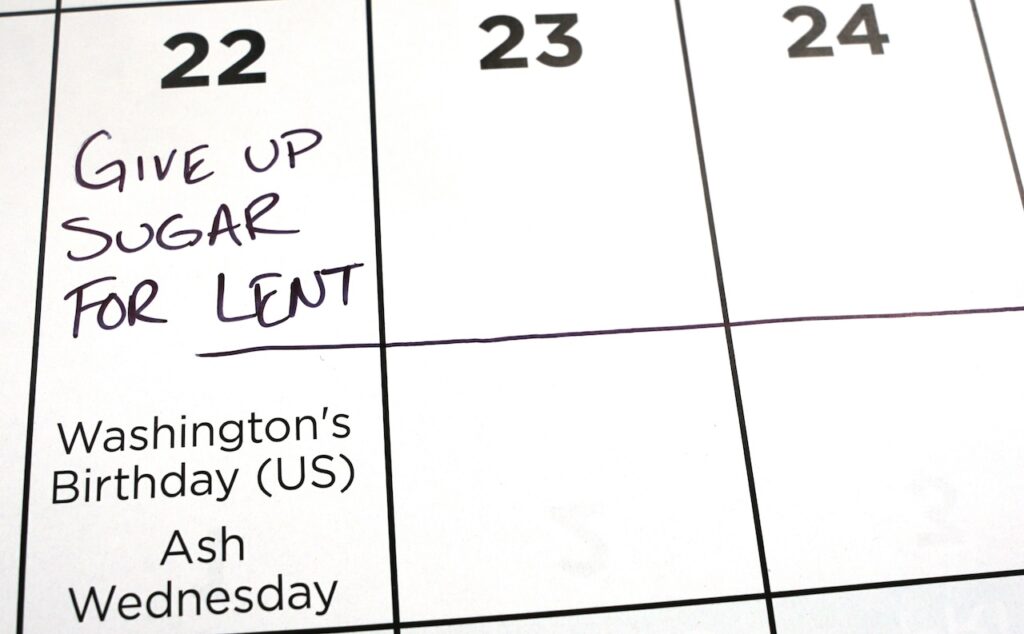Tempus fugit. Time flies. It seems the older we get, the more we realize how quickly time passes, and it’s especially true during this liturgical cycle. We’re only a few weeks into Ordinary Time, and our attention is already being turned toward the season of Lent.
Next Wednesday, the Church will set aside green vestments, remove flowers from the sanctuary, and once again invite the faithful to come forward to receive ashes on their foreheads. The ritual is a stark reminder that all things are passing, including life. So, making the best use of our time should be a priority, and Lent provides the perfect opportunity.
Since prior planning is key, we needn’t wait until Ash Wednesday to decide how this Lent can help deepen our relationship with God. This year Ash Wednesday and Valentine’s Day happen to fall on the same day, a happy coincidence that invites us to offer all we do to God as an act of love rather than from a sense of obligation. When days of fast and abstinence are embraced as a gift to God in the same spirit that lovers give each other gifts on Valentine’s Day, our sacrifice is not only more efficacious, but it fills our heart with joy.
Although we should take the season of Lent seriously, it can be done in a spirit of joy when the focus is on “giving” rather than on “giving up.” When prayer, fasting and almsgiving are intentional, the focus is not about remaining faithful to our resolutions for the duration of Lent, but to be mindful of what we are doing each day.
One way to do this is by being specific. Resolutions to spend more time in prayer, or fast from certain foods or activities, can easily get lost amid busy schedules and daily commitments, whereas being specific can increase the likeliness of our being faithful. Rather than deciding to pray more often during Lent, resolve to rise fifteen minutes earlier than usual so that you can spend that time in prayer every morning.
Another helpful hint could be to designate prayer or sacrificial offerings for specific intentions on certain days of the week. Some examples could be:
- Mondays: Plan to fast from sweets for the souls in purgatory.
- Tuesdays: Do a good deed or say something kind to a person who annoys you or listen thoughtfully and respectfully to someone whose views are different from yours.
- Wednesdays: Make a visit to the Blessed Sacrament for those who have left the Church or are struggling with issues of faith.
- Thursdays: Refrain from a favorite television program or from surfing the internet for victims of violence or sexual abuse.
- Fridays: Pray the Chaplet of Divine Mercy for souls who are close to death.
- Saturdays: Pray the rosary for the sick and infirmed.
- Sundays: Contribute a few extra dollars to the church collection, the homeless, or a favorite charity.
If this all seems too much to remember, you may prefer concentrating on the same good deed or sacrifice, but offer it for different people each day.
Committing your resolutions to paper, either on a calendar or someplace where you’ll be sure to see it, helps keep each resolution fresh and intentional. Journaling about your experience each day or at the end of the week can also be helpful. In this way, not only are you more likely to remain faithful to your Lenten resolutions, but you’ll be able to reflect on how these spiritual practices impact your life.
Then at the end of Lent, not only will you have journeyed closer to Jesus, you may decide to continue at least some of the practices after Lent. Being specific helps us to become more mindful not only about our actions, but the reason we do what we do, which leads to self-knowledge.
Self-knowledge is important because knowledge of God and knowledge of self go hand in hand. However, unless our understanding of God leads to a change in our behavior, it remains simply an intellectual exercise. When we pause and ponder the reason behind our actions, we will be less prone to repeat past mistakes that lead us away form God, so it’s well worth the effort because time is short.
No matter the day, when it passes, it will never return. What goes undone will remain a lost opportunity. This is the reason that every moment counts. Life is precious, so let’s make the most of each day. Of ourselves it’s impossible, but when we ask God to help us, all things are possible. And so we give thanks because this is the time of our salvation!
Barbara Hughes is an award-winning author, retreat facilitator and spiritual guide. She lives in Virginia Beach and can be reached at [email protected].

